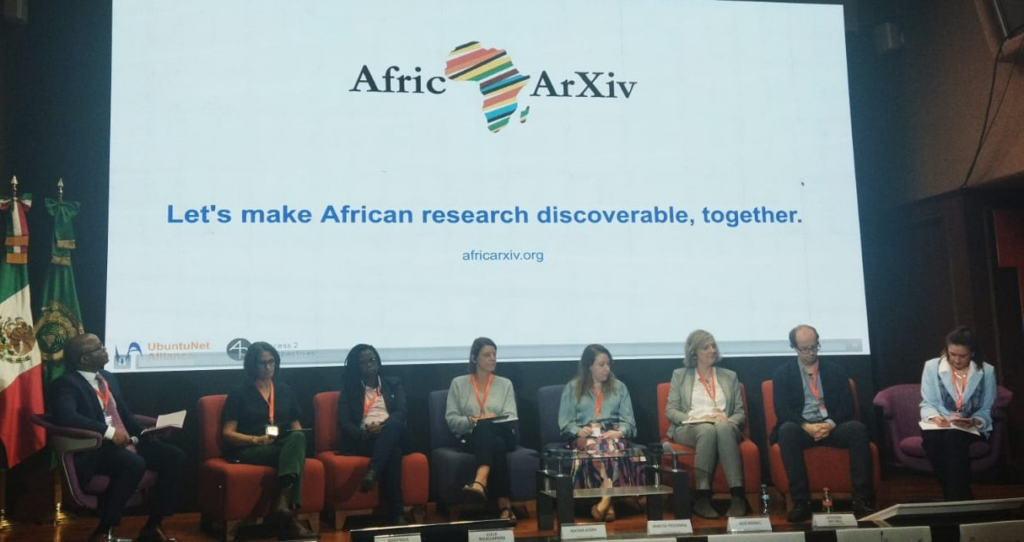Presentation held at the II DIAMOND OPEN ACCESS CONFERENCE, October 25 – 26, 2023. Toluca, Mexico

Plenary session: Sustainability and funding of diamond open access
Capacity building and sustainable finances will be important for the future development of diamond open access. This session discusses how we can further strengthen, sustain, and fund a diamond open access scholarly communication model.
- Jo Havemann, Open Science Communication Consultant and Trainer, AfricArXiv (online)
- Catherine Mitchell, Director, Publishing, Archives, and Digitization, California Digital Library, University of California, USA
- Ross Mounce, Director Open Access Programmes, Arcadia
- Vanessa Proudman, Director, SPARC Europe and Executive Group Chair, Global Sustainability Coalition for Open Science Services (SCOSS)
- Heather Joseph, Executive Director, SPARC
- Giulia Malaguarnera, Board member and former Secretary, Marie Curie Alumni Association (MCAA) and Outreach and Engagement Officer, OpenAIRE
- Nokuthula Mchunu, Deputy Director, African Open Science Platform (AOSP), National Research Foundation, South Africa
- Jeroen Sondervan, Programme Leader Open Scholarly Communication, Open Science NL, Netherlands (online)
Moderator: Eurico Wongo Gungula, Rector, Universidade Óscar Ribas (UOR), Angola

Related materials
- Posters presented during the poster session: https://globaldiamantoa.org/diamond-open-access-conference/en/posters/
- Action Plan for Diamond Open Access
- Conclusions and Way Forward
- Manifiesto sobre la Ciencia como Bien Público Global: Acceso Abierto No Comercial (translation below)
Manifesto on Science as Global Public Good: Open Access – non-commercial
“An old tradition and a new technology converge to make a good possible.” unprecedented public. The old tradition is the desire of scientists and academics for publishing the fruits of their research in academic journals without having to pay for it, just for the pleasure of investigating and for knowledge” (BOAI, 2002). With the advent of technology, new ways of publishing and accessing scientific knowledge and information appear. Twenty years after the Budapest Declarations (2002), Bethesda (2003) and Berlin (2003), the initial objectives of openness have been diverted time and time again due to commercial interests and systemic problems inherent to several proposed models to achieve Open Access. It is necessary to analyze the various routes to achieve Open Access based on the values of equity, quality, sustainability and usability in order to achieve science as a global conversation. Commercial Open Access replaces subscription fees for scientific journals with charges of article processing to the authors (APC, acronym of the term in English article processing charges), a distortion of the original movement. Likewise, there have emerged “transformative” agreements that, in practice, have become the institutionalization of a model from the commercial sector to privatize a public good: knowledge.
Thus, Open Access has been forced to adopt new names to distinguish the commercial solutions from non-commercial ones, surrounding the original objective of the movement. Is just as Diamond Open Access emerges. Scientific journals stopped being a communication vehicle to be a product of market, first with quotas for reading and later with quotas for publishing. One of the problems of commercialization is the consequent exclusion that it generates, thus breaking with one of the essential conditions of public goods: non-exclusion. On the contrary, the Advancement in technologies and the non-commercial sustainability model have allowed the consumption non-rival of scientific knowledge, the second essential condition of public goods: non-rival rivalry. The problem is fed back by the evaluation systems of scientific activity, built around commercial channels of generation, circulation, consumption and assessment of scientific knowledge. Which creates a vicious circle that is impossible to break. from the logic of the market and that puts at risk, not only scientific development but also the public construction and preservation of collective scientific memory. Open Access via Diamond, understood as publication without fees for reading or publishing created and maintained by academic and scientific organizations; as well as Open Access via green, are references of non-commercial models compatible with the paradigm of public goods, and are inclusive by definition. The principles that govern this manifesto are the following: Universal law Science is a global public good and access to it is a universal right Equity, diversity and multilingualism Science is inclusive, multilingual, accessible, reusable and collaborative. Property of the academy and heritage of the humanity Scientific production is property of the academy and is due to the development and progress of society as a heritage of humanity Recognition and appreciation Accreditation, research and funding entities must recognize, evaluate and encourage non-commercial means of production and circulation of scientific knowledge. Collaboration The interaction and collaboration between non-commercial agents, publications scientific and open infrastructure is necessary for the construction of public goods ecosystems. It is imperative to declare Non-Commercial Open Access, through its Diamond and Green routes, property of the academy a route to reach Science as a Global Public Good. One approach historically dominant in Latin America, the Caribbean and many other countries in other regions. Likewise, experience and systemic challenges invite us to collectively build an ecosystem scientific that gives all people the opportunity to participate. Likewise, the research community must be recognized for its efforts to preserve a model of communication for the benefit of their societies and that gives guidelines to processes and conditions that allow us to control that knowledge returns to whom it belongs, produces it and sustains it with public funds. In line with the progress made in recognizing the contributions of the non-commercial sector for Open Access and Open Science previously manifested in collective efforts such as the UNESCO Recommendations on Open Science and the signs dBudapest Open Access Initiative (BOAI) on its 20th anniversary, A call to action is made aimed at institutions, governments, the research community and all actors to strengthen, recognize, sustain and advance towards a Science as a Global Public Good.
